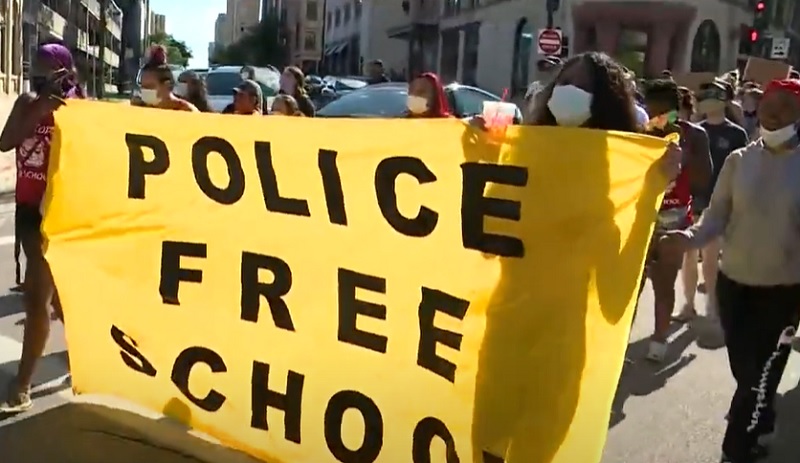
My wife is a music teacher and belongs to a Facebook group for elementary music teachers. A member of the group posted a question about ukuleles but instead got angry lectures because his FB profile photo was a blue line flag. “If you are a music teacher and have a Blue Lives Matter flag, you probably aren’t going to gain much respect.” “Blue Lives Matter is a harmful movement that actively seeks to silence Black people.” When other teachers rebutted these kinds of comments, another commenter said “Calling out racist behavior is not being unkind.”
Other angry posters cited the often-heard claim that “thousands” of black people are killed by police. If this is the thought process of a significant number of teachers in this subject, what is going on in the classrooms teaching history, social science, and civics?
A racist rant by a Black motorist lawfully stopped by a Latino Los Angeles County deputy recently was captured on camera. “You’re a murderer, OK?” says the female driver who identified herself as a teacher. In another widely reported incident, an adjunct professor for Cypress College in California was captured on a Zoom classroom session antagonizing a student who called police officers heroes. The instructor stated that “A lot of police officers have committed atrocious crimes and have gotten away with it, and have never been convicted of any of it” and “I don’t trust them. My life’s in more danger in their presence.” When asked by the student who she would call if faced with an armed attacker, the teacher responded “I wouldn’t call anybody.” She also stated that policing in America started with slave hunters.
If teachers are communicating their anti-police position to students from elementary to college, the least we could ask for is that it be presented with facts, and with respect for dissenting discussion. Saying that American policing began with slave hunters, or that “thousands” of Black people are killed by police is no better than teaching that the earth is flat or that gravity is just a theory. The sharing of ignorance, bias, and unsubstantiated opinion from a position of power is the antithesis of education.
The National Education Association, the most powerful teacher’s professional association, and the largest union in the country supports the Black Lives Matter movement, including the idea that schools with disciplinary measures are pipelines to prison. Under their topic about safe schools, the leading statement on their website is “When police and immigration authorities aggressively pursue enforcement activities on or around school property, they interfere with all students’ ability to learn” advocating for police-free schools, claiming widespread police brutality inside schools.
There are many correlations between teachers and police officers. Both get blamed for things out of their control. Both deal with increasing disrespect and resistance. Both are frequently evaluated, and both are subject to investigation of their ability and character before hiring. Both are recruited from the human race with all of its potential for error and misbehavior. In fact, a quick internet search on teacher misconduct will indicate the extent of the problem of teacher misconduct including sexual exploitation of students, as well as concerns about a uniform platform for reporting, and serious questions about unreported misconduct.
Police agencies have been supporting schools and teachers for decades. Key components of many community policing outreach efforts have been focused on cooperation with schools. Most schools have very productive and mutually beneficial partnerships with their local public safety professionals. Teachers and police have no reason to be adversaries, other than the unsubstantiated narrative of wholesale racism and incompetence in law enforcement that has taken root like the worst kind of predatory weed.
Law enforcement leaders, school administrators, and parents are all concerned about school safety and good citizenship. Those relationships that remain must be reinforced and celebrated. Where those relationships have been damaged by the ill-advised removal of school resource officers, intentional efforts to repair those relationships must happen. Some school districts are forbidding the inclusion of police in responding to criminal behavior. The involvement of law enforcement with crimes on school property is something worthy of discussion, but teachers and well-behaved students can suffer real harm if violent behavior is not handled appropriately.
Teachers and law enforcement are on the same side. It will take the efforts of administrators, school boards, parents, and police leaders to keep those positive connections.